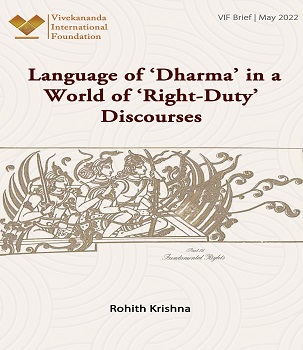
Human rights dry up without a language of human duties, which have consequences for the right protection demands itself. But again, the language of human duties withers without a language of Dharma. This article argues that it is a crisis that the modern secular Western society faces in particular, which exposes the limitation of contemporary right-duty discourse in general. From a standpoint that recognises this particular predicament, when we perceive the discourse of Dharma, we can see how we could make the language of Dharma through Itihāsa, Purāṇa, Jātaka, etc, relevant and applicable even in our times, which is directed by universal declarations, law codes and constitutional morality. Their relevance in today’s world are not to be identified merely as a case of a random cultural aspiration, a nostalgia for the past, or as a post colonial sentiment, rather, as a solution based on pedagogical grounds to become more responsible and responsive to the existing limitations or crisis that the contemporary right-duty discourse faces at the global level.






Post new comment